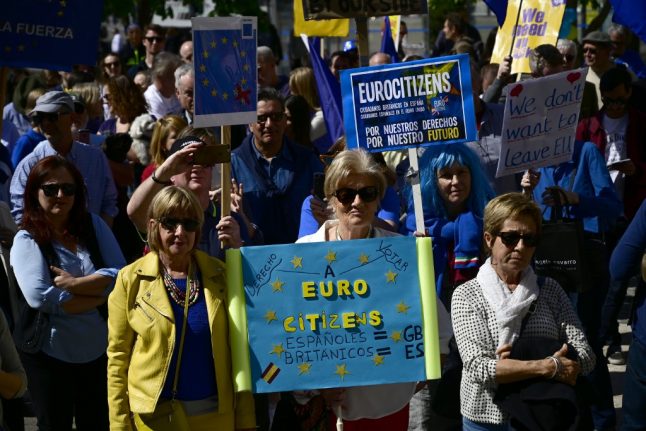When we wouldn’t have known what a Withdrawal Agreement was, even if it came up and bit us on the backside? Me neither!
I was a political virgin before the June 2016 referendum. I took little interest in current affairs, and zero interest in the antics of the UK government.
I felt perfectly content living in Spain and in ignorance, and felt that any decisions made in Westminster were of little consequence to me.
The referendum result shocked me out of my naivety and changed my life. It woke me from a self-induced, rather pleasant coma and, over time, turned me into a different person. It turned me into a campaigner.
Before Brexit, I had never campaigned for anything in my life. I once attended an anti-apartheid rally in Trafalgar Square, several decades ago.
That was the sum total of my political activism, and it lasted all of five minutes.
I never set out to become an anti-Brexit campaigner, but I became increasingly involved.
When I look back, I’m still surprised at the speed of my transformation.
Within three months of engaging with the Bremain in Spain campaign, I was the chairperson.
Many Bremain members describe how Brexit has changed not only British society, but their own lives and natures as well.
They speak of the damage it has done to their sense of security, their health and well-being, and the anxiety it causes about the future.
Many people explain how their post-Brexit relationships with family and friends reflect the divisiveness now experienced by UK society.
Britain is no longer divided along party-political lines, but by how we feel about our wider European family.
I’ve heard people say they are quick to anger now; they’re more emotional, lacking in patience. I share those feelings entirely.
READ MORE:
- OPINION: Brits in the EU have been silenced too frequently and for too long
- OPINION: This is the last chance to show Brits in the EU matter more than Cheddar cheese
- OPINION: Why the EU elections are so important for Brits in Spain
In the past, I always avoided confrontation. I kept calm and cool. Where politics was concerned, I never voiced an opinion – after all, I didn’t know what I was talking about! Now it’s difficult to shut me up – in fact, I’m not sure I have another topic of conversation!
Along the way, my language has become more choice. I understand, from talking to other Brexit-campaigners, that this is a common side-effect.
Walls are turning blue all over Spain and the UK, from the constant shouting and swearing at TV screens whenever May or Farage make an unwanted appearance.
Brexit has made me a different person in many negative ways, but it has changed me for the better too. It has taught me new skills and given me the confidence to do many things I never thought I could do before.
For example, I would never have imagined delivering a speech to a room of 100 people, let alone addressing tens of thousands.
I never thought I would hold my own in a political debate, write articles for the media, or be interviewed on TV and radio.
Now this seems natural and commonplace.
I value one thing about Brexit: that it has given me a passion and commitment to change my future and, I hope, the future of others.
I don’t understand the source of the passion, or what will happen to it once Brexit is over, but I do know I’m not going to waste it.
So long as I feel this strongly about keeping the UK in the EU, I will do everything in my power to maintain the fight.
The cross-party talks are dead, and Theresa May won’t be Prime Minister for much longer.
Every day, week, month, that passes makes a Brexit deal less likely. Thankfully, the British parliament doesn’t have the stomach or courage to leave the EU without a deal.
When all other options have been ruled out, there really is only one option left, and that’s remaining. We already have the best deal possible – let’s save ourselves from further self-harm and cling on to it for dear life!
By Sue Wilson – Chair of Bremain in Spain

For all you need to know about the European Elections, take a look at the Bremain in Spain European Election Special:




 Please whitelist us to continue reading.
Please whitelist us to continue reading.
Member comments